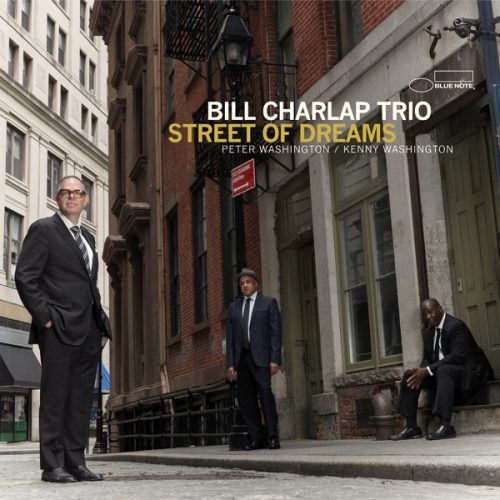November 11, 2021
Pianist Bill Charlap makes his much-anticipated return to Blue Note Records after more than a decade with Street of Dreams, a stunning new album featuring his revered longstanding trio with bassist Peter Washington and drummer Kenny Washington.
Named for the 1930s standard penned by Victor Young and Samuel M. Lewis, Street of Dreams is a celebration of New York City as it emerges from an unprecedentedly challenging period. As reflected in the eight impeccably curated songs on the album, a delightful mix of jazz classics and Songbook favorites, the city is transformed into a timeless fantasy of itself, one that has perhaps been kept alive in the dreams of musicians and audiences alike while cooped up in pandemic-necessitated isolation.
It’s also a reflection of the literal and metaphorical road traveled together by Charlap and the Washingtons (no relation, other than the one forged on bandstands over decades of collaboration) during nearly 25 years as a trio. During that time they’ve become so deeply attuned that on Street of Dreams they seem to breathe as one, whether setting off into rollicking swing or fragile balladry.
The album is thus a celebration of these three eloquent voices reconvening, both as a continuation of their profound relationship together and as an end to the disruption caused by the events of 2020. So it’s apt that this homecoming takes place on Blue Note, which released so many of the trio’s acclaimed recordings throughout the first decade of this millennium.
“I’m very glad to be back on Blue Note again,” Charlap says. “My relationship with the label is very important to me, between the incredible history of all the major artists who have made recordings for the label and my own history. It really is the premiere label for our music.”
The first meeting between Charlap, Peter Washington and Kenny Washington occurred on December 22, 1997 at the recording session for the trio’s debut release All Through the Night. The pianist had enlisted a rhythm section already known as a formidable unit, though he could not have predicted the immediate sparks generated by the three of them together.
“When you fall in love, the chemistry is BANG!” Charlap describes. “It’s 100 percent. With Kenny and Peter, the chemistry was instant. I remember we were playing Cole Porter’s ‘All Through the Night’ and I looked at Kenny, who was playing those magnificent brushes, and there was a feeling of, ‘Oh wow, there’s something here that is greater than its parts.’ And we went from there.”
Though it’s his name on the marquee, Charlap insists that the trio is a collective, with all three members playing an equal role. “For me, it’s truly 33 1/3 percent each one of us. What I enjoy listening to is all three of us together in equal parts. That’s really what a band is – at least, that’s what this band is. Everybody’s contributing equally and there’s room to hear a great deal of nuance and a commitment to the song. Our music is about improvising, of course, but the depth of the improvising has grown, the ability to change direction within an idea and surprise each other, ourselves and the listeners while still serving the song.”
That growth is evident from the outset of Street of Dreams, with the trio’s playful take on Dave Brubeck’s Duke Ellington homage “The Duke.” With one stroke the continuity of the jazz piano tradition is evoked and honored, though without being burdened by the weight of history. Charlap’s touch is sparklingly light, matched by Kenny’s feathery tap dance across his cymbals and buoyed by Peter’s nimble yet robust bass. When Kenny switches to sticks, the depth of swing—a foundational characteristic of this trio—is irrepressible.
Ellington himself makes an appearance via the trio’s exquisite rendition of “Day Dream,” written in partnership with Billy Strayhorn. Kenny’s aforementioned “magnificent brushes” are here in all their embracing rapture, while Charlap spins gossamer webs of delicate melancholy. It’s in the aching spaces between the notes that one comes to appreciate not only the mesmerizing patience and subtlety of the trio but the expert work of engineer James Farber.
“James Farber is such a brilliant recording engineer,” praises Charlap. “He captures the balance of the instruments so beautifully, along with all the nuance of the dynamics that we create without manufacturing any of it. It’s simply a true snapshot of what we do together.”
The trio’s approach to Burton Lane and Alan Jay Lerner’s “You’re All the World to Me,” originally composed for Fred Astaire, captures the sprightly agility of the famed hoofer, while “I’ll Know,” from Guys and Dolls, is a nod to songwriter Frank Loesser, mentor to the pianist’s Broadway songwriter father Morris “Moose” Charlap. “Your Host” is a Kenny Burrell composition originally recorded with Kenny Clarke, Pepper Adams, Tommy Flanagan and Paul Chambers on the 1956 album Jazzmen: Detroit, which Charlap refers to as “one of my favorite albums” (surely a lengthy list).
The far more familiar Johnny Green-Edward Heyman tune “Out of Nowhere” is given a breezy, up-tempo treatment that yields to some of the album’s most spirited interaction between the trio mates, which takes on the casual, bantering sensation of eavesdropping on a backstage conversation. A contemplative and interior interpretation of Michel Legrand’s “What Are You Doing the Rest of Your Life?” crystallizes the tenuous uncertainty and yearning behind that question, whatever its context, while serving as a love letter to Charlap’s longtime friends Alan and Marilyn Bergman, the song’s lyricists.
The title track closes the album with the feel of a last call blues lament, eyes bleary and speech a tad slurred but emotions in all too clear focus. It’s the sort of vivid portraiture that only a band with this level of experience and empathy can paint with such minimal elements and reflects their longevity while only being enhanced by their time away from audiences.
“One of the main reasons why we still love to play together is that it seems to be getting deeper because you grow into yourself further and further,” Charlap explains. “There’s a feeling all the way through this album, and it’s not accidental – it has to do with every gesture and note meaning something. I think maybe the time that we’ve had to reflect has made that diamond even more dense.”







